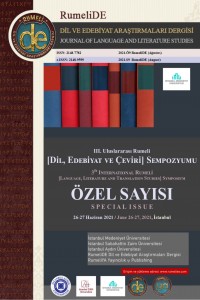Abstract
Bellek, insanları geçmişleriyle buluşturmanın bir yoludur. Tarihi binalar, müzeler, arşivler ve anıtlar, insanların geçmişlerini hatırlamalarına yardımcı olan araçlardan bazılarıdır (Nora, 1989). Aynı şekilde kitaplarda insanların ortak geçmişleri hakkında bir bakış açısına sahip olmalarına yardımcı olur. Ancak bunlar, Fahrenheit 451'de anlatıldığı gibi distopik bir toplumda anlamını yitirir. Anılar, insan mutluluğunu ve toplumun temellerini yok eden ve tehdit eden silahlara dönüşür. Bu sebeple, anılar distopik bir toplumun temellerinde yer almazlar. Dahası, Assmann'ın (1989) belirttiği gibi, hafıza baskı altında bir direniş aracı haline gelebilir. Buna karşı totaliter devlet, insanları uyuşturmak için teknolojiyi kullanır. Teknolojinin hipnotik dünyasına gömülen insanlar, rejimin egemenliğine ciddi bir tehdit oluşturmayan pasif özneler haline gelir. Fakat, Bradbury’nin romanında kitaplara bağlı kalan insanlar, alacakaranlık anılarının çatlaması için bile hala umut olduğunu ifade etmektedir (Huyssen, 1995). Bu makale, distopik bir dünyada belleğin olası doğasını anlamak için Fahrenheit 451’de kitaplar, teknoloji ve devlet söylemi arasındaki ilişkiyi araştıracaktır.
References
- Bloom, H. (2008). Bloom’s Modern Critical Interpretations Ray Bradbury’s Fahrenheit 451. New York: Infobase.
- Bradbury, R. (2008). Fahrenheit 451, Harper Voyager, London.
- Halbwachs, M. (1992). On Collective Memory, edt. by Lewis A. Coser. Chicago: The University of Chicago.
- Kracauer, S. (1969). The Last Things Before the Last. Oxford University Press. New York.
- Nietzsche, F. W. (1997). ‘On the Uses and Disadvantages of History for Life’ (Trans. R. J. Hollingdale), Untimely Meditations, edt. By Daniel Breazeale. Cambridge: Cambridge University Press.
- Nolan, F. W. (1963, May). Bradbury: Prose Poet in the Age of Space, Fantasy and Science Fiction, 24, 8.
- Nora, P. (1989). Between Memory and History: Les Lieux de Memoire, Representations, 26, 7-25.
- Proust, M. (2006). Remembrance of Things Past (Trans. C. K. Scott Moncrieff). London: Wordsworth Editions.
- Ricoeur, P. (2004). Memory, History, Forgetting. Chicago: The University of Chicago Press.
- Sisk, D. W. (1997). Transformations of Language in Modern Dystopias. London: Greenwood Press
- Sontag, S. (2001). On Photography. New York: Picador.
- Tilmans, K., van Vree F., Winter, J. (eds.) (2010). Performing the Past: Memory, History and Identity in Modern Europe. Amsterdam: Amsterdam University Press.
- Verovšek, P. J. (2014, Summer). Unexpected Support for European Integration: Memory, Rupture, and Totalitarianism in Arendt's Political Theory, The Review of Politics, 76,3, 389-413. Last Accessed, https://www.jstor.org/stable/43670988
- Wien, H. (2012). Claiming Mastery of the Word. (Master’s Thesis). Tromso: Universitetet Tromso. Last Accessed, https://munin. uit.no/bitstream/handle/10037/4848/thesis.pdf?sequence=2
Abstract
Memory is a way of connecting people with their pasts. Historical buildings, museums, archives and monuments are some of the tools which help people to remember their pasts (Nora, 1989). Books also help people to have a perspective about their communal past. However, these things lose their meaning in a dystopian society like the one portrayed in Fahrenheit 451. Memories turn into weapons that destruct and threaten human happiness and the foundations of society. For this reason, they are discarded from the foundations of the dystopic society. Furthermore, as Assmann (1989) notes, memory can become a tool of resistance under oppression. Thus, the totalitarian state uses technology to mesmerize people. By sinking into the hypnotic world of technology, people become passive subjects who pose no serious threats to the regime’s sovereignty. However, in Bradbury’s novel, the people who hold to books represent that there is still hope even for a fissure of twilight memories (Huyssen, 1995). This paper will investigate the relationship between books, technology and the discourse of the state in Fahrenheit 451 in order to understand the possible nature of memory in a dystopian world.
Keywords
References
- Bloom, H. (2008). Bloom’s Modern Critical Interpretations Ray Bradbury’s Fahrenheit 451. New York: Infobase.
- Bradbury, R. (2008). Fahrenheit 451, Harper Voyager, London.
- Halbwachs, M. (1992). On Collective Memory, edt. by Lewis A. Coser. Chicago: The University of Chicago.
- Kracauer, S. (1969). The Last Things Before the Last. Oxford University Press. New York.
- Nietzsche, F. W. (1997). ‘On the Uses and Disadvantages of History for Life’ (Trans. R. J. Hollingdale), Untimely Meditations, edt. By Daniel Breazeale. Cambridge: Cambridge University Press.
- Nolan, F. W. (1963, May). Bradbury: Prose Poet in the Age of Space, Fantasy and Science Fiction, 24, 8.
- Nora, P. (1989). Between Memory and History: Les Lieux de Memoire, Representations, 26, 7-25.
- Proust, M. (2006). Remembrance of Things Past (Trans. C. K. Scott Moncrieff). London: Wordsworth Editions.
- Ricoeur, P. (2004). Memory, History, Forgetting. Chicago: The University of Chicago Press.
- Sisk, D. W. (1997). Transformations of Language in Modern Dystopias. London: Greenwood Press
- Sontag, S. (2001). On Photography. New York: Picador.
- Tilmans, K., van Vree F., Winter, J. (eds.) (2010). Performing the Past: Memory, History and Identity in Modern Europe. Amsterdam: Amsterdam University Press.
- Verovšek, P. J. (2014, Summer). Unexpected Support for European Integration: Memory, Rupture, and Totalitarianism in Arendt's Political Theory, The Review of Politics, 76,3, 389-413. Last Accessed, https://www.jstor.org/stable/43670988
- Wien, H. (2012). Claiming Mastery of the Word. (Master’s Thesis). Tromso: Universitetet Tromso. Last Accessed, https://munin. uit.no/bitstream/handle/10037/4848/thesis.pdf?sequence=2
Details
| Primary Language | English |
|---|---|
| Subjects | Linguistics |
| Journal Section | Research Article |
| Authors | |
| Publication Date | August 21, 2021 |
| Published in Issue | Year 2021 Issue: Ö9 |

